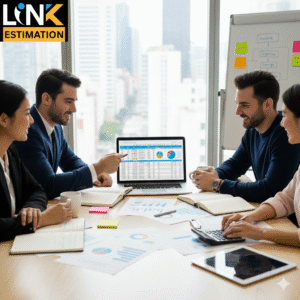The U.S. food-delivery market has transformed from a niche convenience into a high-stakes digital economy—and behind that transformation are specialist teams building the technology that powers orders, couriers, restaurants and cloud kitchens. That rise has created strong demand for food delivery application development companies that can deliver scalable apps, integrations, and data-driven features restaurants and platforms need to compete.
Market snapshot: why now?
Online food delivery in the U.S. is large and still growing. Recent market estimates put U.S. online food delivery revenues in the tens of billions of dollars for 2024 and project steady high-single-digit to low-double-digit CAGR through the rest of the decade — a scale that attracts startups, investors and enterprises to the space.
Two structural forces explain the acceleration: changing consumer behavior (greater appetite for convenience and subscription-style meal programs) and platform consolidation/expansion by major players into grocery, meal kits and enterprise food services. These trends mean more restaurants, chains and new delivery models (cloud kitchens, workplace meal programs) need bespoke technology — which is where specialist development companies step in.
What a food delivery application development company actually builds
A modern food delivery application development company offers end-to-end capabilities tailored to the delivery ecosystem. Core offerings typically include:
-
Consumer apps (iOS/Android): intuitive menus, ordering flows, push notifications, personalization and loyalty.
-
Courier apps: optimized route navigation, batching, delivery tracking and earnings dashboards.
-
Restaurant/merchant portals: order management, menu and price control, analytics and promoter tools.
-
Admin dashboards & ops tools: order orchestration, fraud detection, marketplace management and reporting.
-
Integrations: POS systems, payment gateways, mapping APIs, third-party logistics and kitchen display systems (KDS).
-
Cloud & scale architecture: containerized services, microservices, autoscaling, and analytics pipelines to handle peaks.
Technology trends shaping offerings
Top development partners are investing in a handful of capabilities that are now table stakes:
-
Real-time tracking and ETA prediction powered by mapping APIs and telemetry.
-
AI-driven personalization and recommendations — upsells, predicted reorder times and tailored promos.
-
Route optimization & dynamic batching to reduce delivery times and cost per order.
-
Serverless/cloud-first architectures and microservices for reliability during spikes.
-
Data platforms & analytics that turn order-level signals into pricing, marketing and logistics improvements.
These tech advances let development companies build experiences that increase retention and lower operational costs for clients.
Why specialist development firms are winning business
There are three advantages specialist food delivery application development companies bring compared with generalist app shops:
-
Domain knowledge — they understand order flows, courier economics, peak-hour behavior and restaurant constraints.
-
Reusable components — prebuilt modules for menus, batching, and payouts shorten time-to-market and lower cost.
-
Compliance and integrations — experience integrating POS, liability and payment regulations reduces launch risk.
Examples of vendors positioning themselves in this niche advertise end-to-end products for restaurants, aggregators and cloud kitchens—demonstrating market demand for specialists rather than one-off mobile apps.
Typical costs & timelines (what clients should expect)
Costs vary widely by scope. A basic single-restaurant ordering app + courier/client basics can be launched as an MVP in a few months with modest budgets, while multi-restaurant marketplace platforms with real-time logistics, robust admin consoles and analytics are larger projects that can run into the tens to low hundreds of thousands of dollars. Many vendors offer staged development (MVP → expansion → optimization) to match budgets and reduce risk. (Note: exact quotes depend on tech stack, compliance needs, and integrations.)
How to choose the right food delivery application development company
When evaluating partners, look for:
-
Relevant case studies — real examples of delivery or restaurant tech you can test.
-
Systems thinking — evidence they design for scale (microservices, cloud, caching, queues).
-
Operations-focused delivery — logistics expertise (routing, batching, SLA management).
-
Post-launch support — monitoring, A/B testing and rapid iteration plans.
-
Data & privacy competence — secure payments, user-data controls, and compliance with local rules.
Also check sample SLAs, uptime guarantees and whether the company offers product management support (not just engineering). A good partner helps with product-market fit and monetization strategy as well as code.
Risks & pitfalls to watch
-
Overbuilding early — costly features that don’t move metrics. Start with core retention/fulfillment drivers (speed, reliability, UX).
-
Poor integration with restaurant workflows — if the merchant experience is bad, the app won’t scale.
-
Ignoring unit economics — a beautiful app is unsustainable if delivery costs aren’t optimized.
Selecting a firm with experience across restaurant operations and logistics reduces these risks.
The future: specialization, consolidation, and vertical expansion
Expect more specialization (apps for meal-subscriptions, corporate catering, or grocery-focused delivery) and continued consolidation among platforms and logistics providers. Development companies that combine deep product thinking with logistics and AI capabilities will be the most sought-after partners as the market moves from pure growth to profitability and margin optimization.
Conclusion
The rise of the U.S. food-delivery economy has created sustained demand for food delivery application development company expertise. Whether you’re a restaurant chain launching an ordering app, a startup building a multi-merchant marketplace, or an investor backing food-tech, partnering with a development firm that understands delivery economics, real-time systems and integrations is now a business imperative. Choose a partner who balances speed-to-market with operational rigor—and you’ll be building not just an app, but a resilient delivery business.






